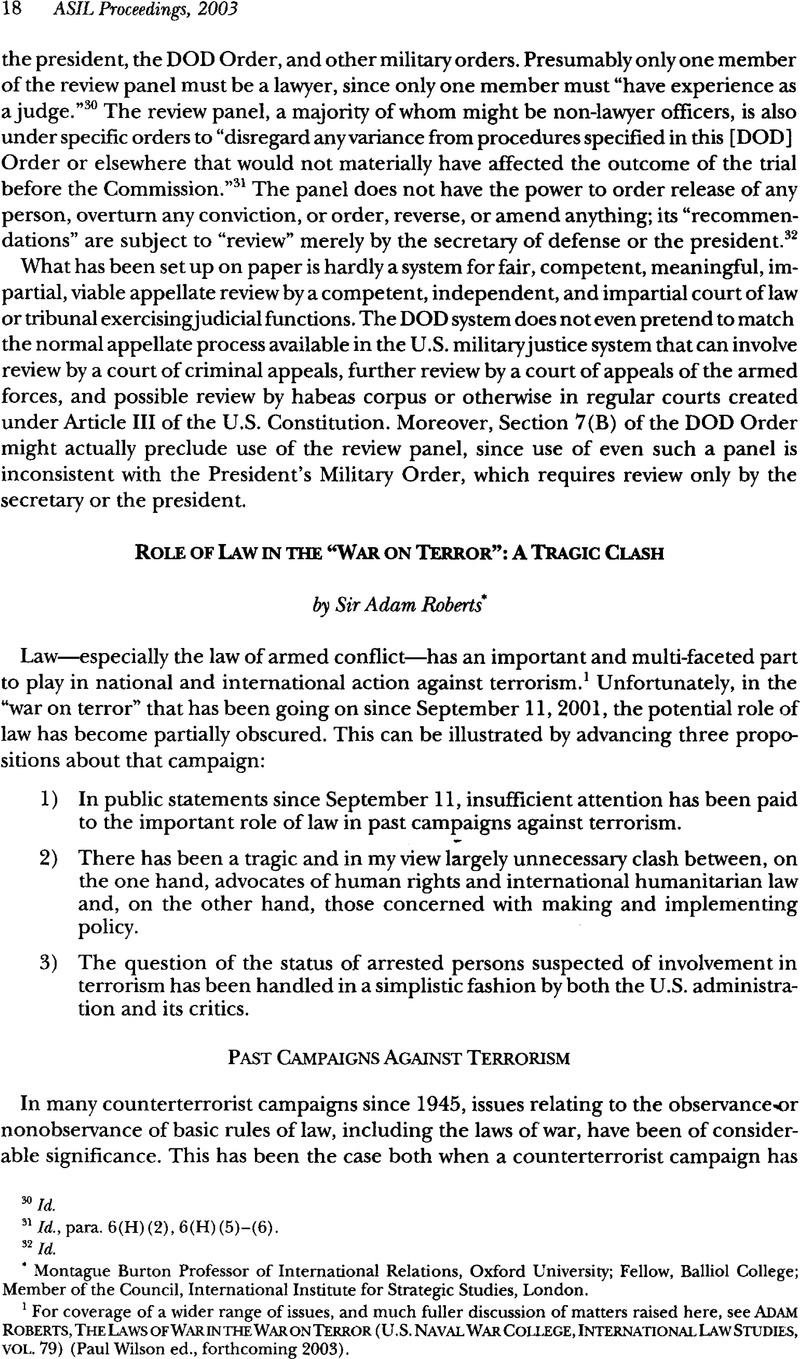No CrossRef data available.
Published online by Cambridge University Press: 28 February 2017

1 For coverage of a wider range of issues, and much fuller discussion of matters raised here, see Adam Roberts, The Laws of War in the War on Terror (U.S. Naval War College, International Law Studies, vol. 79) (Paul Wilson ed., forthcoming 2003).
2 Robert Thompson, Defeating Communist Insurgency: Experiences from Malaya and Vietnam 52 (1966). From 1957 to 1961 the author was successively was deputy secretary and secretary for defence in Malaya. As his and other accounts make clear, in the course of the Malayan emergency there were derogations from human rights standards, including detentions and compulsory relocations of villages.
3 Report of the Committee of Privy Counsellors Appointed to Consider Authorized Procedures for the Interrogation of Persons Suspected of Terrorism, 1-2, 11-23 (1972).
4 Professor Yehuda Blum, Permanent Representative of Israel, at 2374th meeting of UN Security Council, June 5, 1982, Security Council official Records, at 7 (1982).
5 Final Report of the Commission of Inquiry into the Events at the Refugee Camps in Beirut, reprinted in 22 ILM 473 (1983). The Commission was chaired by Yitzhak Kahan, president of the Supreme Court of Israel.
6 In a case concerning detainees in Ansar Prison, on which the Israeli Supreme Court issued a judgment on May 11, 1983, the Israeli authorities asserted that the prisoners were “hostile foreigners detained because they belong to the forces of terrorist organizations, or because of their connections or closeness to terrorist organizations.” Israel, while refusing them POW status, claimed to observe “humanitarian guidelines” of the 1949 Geneva Convention Iv on civilians. For details of the case see 13 ISR. Y.B. on Hum. Rts. 360 (1983).
7 ICRC, Memorandum on the Rules of International Humanitarian Law to be Respected by the States Involved in Military Hostilities in Afghanistan, submitted with a covering note to the U.S. and UK governments, Geneva, September 28, 2001. The memorandum was also submitted to certain other governments, including that of Afghanistan. In addition, on the same date, the ICRC sent to the Afghan government a Memorandum on the Rules of International Humanitarian Law to be Respected in the Non-International Armed Conflict in Afghanistan. (Documents on file with author).
8 Id. at 2.
9 ICRC, Memorandum on the Rules of International Humanitarian Law to be Respected by the States Involved in Military Hostilities in Afghanistan, submitted with a covering note to the U.S. and UK governments, Geneva, October 5, 2001. Like the version of September 28 which it replaced, this memorandum was also submitted to certain other governments.
10 ICRC, Aide-Memoire to United States, Nov. 19, 2002. (Similar messages were addressed to Afghanistan and other concerned countries) (on file with author).
11 See SC Res. 1193 (Aug. 28, 1998).
12 On January 8, 2003 the Permanent Mission of the United States in Geneva delivered Aide-Memoire No. 003, which was a detailed response to the ICRC’s Aide-Memoire of November 19, 2002.
13 White House, Office of the Press Secretary, Fact Sheet: Status of Detainees at Guantánamo, Feb. 7, 2002, at 1.
14 See Commentary on Geneva Convention Iii 48 (Jean S. Pictet ed., 1960); Levie, Howard S., Prisoners of War in International Armed Conflict, in 59 US Navalwar College International Law Studies 36-38 (1978)Google Scholar.
15 Although the United States is not a party to the 1977 Geneva Protocol I as a whole, it has stated in general terms that Article 75 is one of the articles in the agreement that it accepts and will implement. Article 75 elaborates a range of fundamental guarantees that are intended to provide minimum protection for all those who do not benefit from more favorable treatment under other rules.
16 U.S. Dep’t of Def. Military Commission Order No. 1: Procedures for Trials by Military Commissions of Certain Non-United States Citizens in the War Against Terrorism, (March 21, 2002), available at <http://www.cdt.org/security>. These regulations draw heavily on 1977 Geneva Protocol I, Article 75(4) (J).